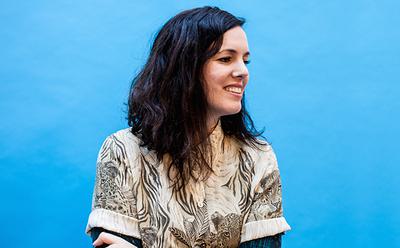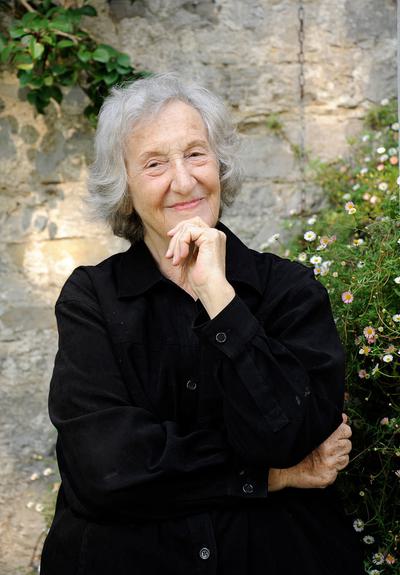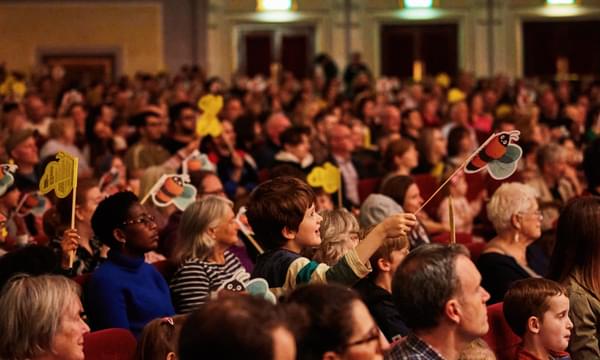
News Story
We pay tribute to the groundbreaking talent in Scotland's classical and contemporary music worlds.

Anna Meredith
This year we are privileged to host not just one but two separate performances from Anna Meredith, the genre-crossing composer who has stormed the pop world with her classical/electronica hybrid album Varmints.
Having established herself as a widely respected musician on the classical stage, in 2016 Anna turned to 1980s soundtracks and arcade games as inspiration for inserting “more volume” into her music. The result earned her the accolade “one of the most innovative voices in British music” from Pitchfork and the 2016 Scottish Album of the Year.
Her diverse classical commissions also show off her talent for thinking outside the box – including a concerto written for beatboxers and a body percussion piece performed by the National Youth Orchestra at the BBC Proms.
Anna will perform Varmints live with Southbank Sinfonia as part of Light on the Shore with Edinburgh Gin Seaside at Leith Theatre on 11 August. She has also collaborated with 59 Productions to create a multimedia piece, Standard Life Aberdeen Opening Event: Five Telegrams, inspired by the end of the Great War’s centenary that will be shown at Usher Hall on 3 August and previously launched the BBC Proms on 13 July.
Martyn Bennett
Popularly known as “the techno piper”, Martyn Bennett was one of the key figures behind modern Celtic fusion. Inspired by club culture as much as by traditional Scottish folk, he blended drum and bass and breaks with sampled bagpipes, fiddles, and folk singers to reveal the new and unexplored avenues that folk music could take.
Sampled fiddle? Folk and breaks? Yes, you heard right. Not the most obvious of pairings, but Bennett saw new genre-blurring opportunities and a symbolic link between the two scenes well worth exploring.
"In some ways bothies have the same, familiar atmosphere to urban nightclubs - arriving for the sound-check when they are merely cold, empty shells is always a spooky experience," he wrote of his final album. "Although the music and songs that have been played in them are totally contrasting it is this same sense of excitement that can transform four bare walls into a chamber of sheer sensual delight."
Greg Lawson is a classical violinist who was a good friend of Martyn Bennett up until Bennett's premature death at only 33 years old. The pair met while playing with the Scottish Ensemble, and bonded over their mutual interest in combining classical with contemporary music. Lawson has paid tribute to their friendship by transforming Bennett’s Bothy Culture – originally conceived solely as an electronic project – into a full live orchestral performance.
“What happens with albums and iconic people is that you don’t interact with them anymore,” Lawson told The Scotsman. “Martyn is like a beautiful mountain that people drive to the foot of and admire, but we don’t go up it. The result is that people don’t play his music. That was my overwhelming desire: I want to play this piece, I want people to hear this piece, and I want it to be a live experience.”
The GRIT Orchestra performs Greg Lawson’s orchestration of Martyn Bennett’s Bothy Culture on 21 August.

Thea Musgrave
Shield your eyes, look up to the sky, and you'll be basked in dazzling light of ... a trumpet? You might not have considered the similarity between the shiny brass instrument and the sun before, but Thea Musgrave did when she composed Helios for Nicholas Daniel. During the concert, she had the musicians who played the piece stand up and act out a picture of Helios, his horses and chariot, and the sun behind.
Musgrave's experiments bring the drama of theatre into the concert hall. Musicians stand up to challenge the conductor in the middle of their performances, or they bring the music visually to life by becoming characters from the pieces that they are playing.
She turns 90 this year, and music fans - including us! - from all over the world are joining her in celebrating a career of re-imagining how music can be presented in concert.
The BBC Scottish Symphony Orchestra and Edinburgh Festival Chorus join together for a rendition of her Turbulent Landscapes on 9 August and the National Youth Choir of Scotland will perform her settings for select London Underground poems on 5 August.
Cecil Coles
The career of one of Scotland’s most underrated composers was tragically cut short when a German sniper shot him in 1918 near the Somme – Cecil Coles had volunteered to help retrieve battle casualties on a stretcher, only to be fatally injured himself.
Music was thought to boost morale amongst the soldiers, and so Coles had been stationed in France with the 9th London Regiment, Queen Victoria Rifles, who he joined as Bandmaster in 1915.
Whilst he was overseas he corresponded with his friend, the composer Gustav Holst, sending him sheets of music that were improvised from what paper was available, spattered with mud, often with hand-drawn manuscript lines. As Martyn Brabbins describes to the BBC, Cecil’s music came from the heart of conflict, and he would likely have been a major figure today if not for his premature death.
The National Youth Orchestra Scotland will play one of Cecil Cole’s poignant works written during his time in the trenches this year on 9 August.
Each of these composers represents the innovative spirit of composition - all are experimental in their own way, be it in creating new hybrid music, exploring the drama of performance, or recasting past masterpieces in new lights. If you'd like to get to know them better, read these two blog posts about how Martyn Bennett composed Bothy Culture and what inspired Anna Meredith's collaboration with 59 Productions. Or, better yet, come and experience the full force of their creations in live performance at the International Festival. Your ears will thank you later.


